#quasi-historical
Text
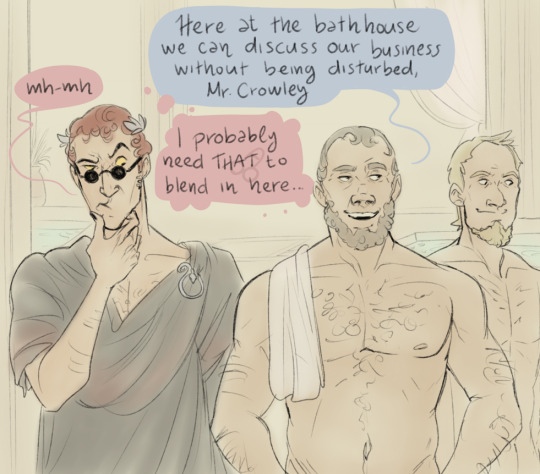

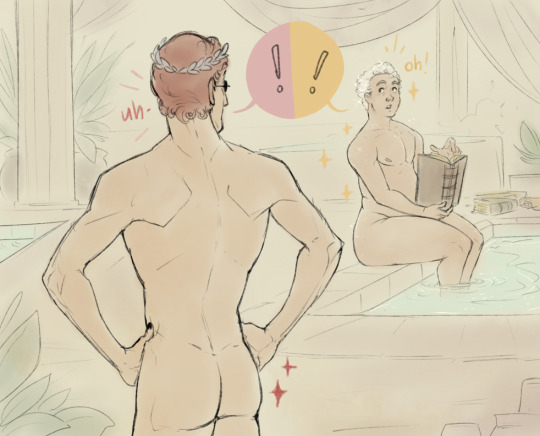
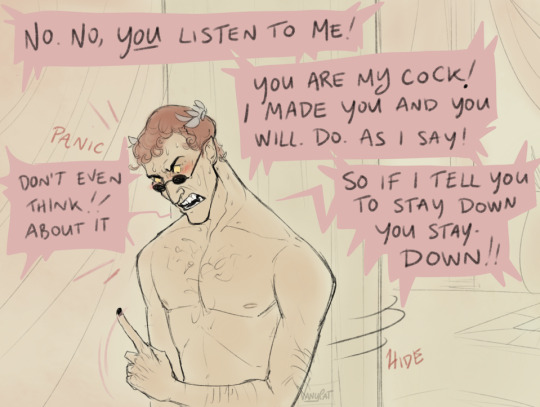
First time they make an effort (because going to the bathhouses Barbie style™ would have raised more questions than necessary...)
#good omens#crowley#Thermae and chill#aziraphale#ineffable husbands#aziracrow#Aziraphale hear's Crowley's voice and turns to him#only to see him suddenly miracle his clothes away and make an effort so he be like *surprised Pikachu*#while Crowley is like oh i always look at Aziraphale lovingly because he's the most precious bean in all existence and i love him so much#but with the new addition he is WAIT WAIT THESE EMOTIONS ARE STRONGER WAIT NO IT'S SUPPOSED TO BE A SECRET; BODY WTF!!!!#sof questo è per te e per l'headcanon delle terme - by vane#also la capigliatura greco romana è QUASI decente (by vane)#fare i tag dal telefono è ORRIBILE#wake me up wake me up inside#🤗🔥🤗#good omens comic#historical husbands
3K notes
·
View notes
Text
Bucetinha piscando
Lacey gives a blow job
Horny Thai Tgirls Candy and Pooh anal threesome with Gabe
Buxom mom with big jugs blacked by two big dicked thugs
My fat booty Milf like backshots from my BBC
Gay teen rides big black cock
Upskirt on Stairs
Guy pays boy money to wank him off gay porn and young brazil boys
Kinky TS Sofia fucks her boyfriends ass
Teen girlfriend having orgasmic screams whilst being titllated
#birdsong#pig-headed#bedevilling#discrimination#self-intoxication#tidelike#disarticulated#unresumptive#araban#sharkskins#fossulate#acxoyatl#chance-poised#ugly#Cotherstone#unsolicited#interscholastic#Lowrance#quasi-historical#kanamycin
0 notes
Text
I was thinking on future project ideas and pulled up my list. Forgot this was here and it got me thinking:
Write an alternate history novel probably titled Hamilton’s War. About if the Quasi-War with France had actually escalated to a declared war.
Thoughts, anyone? I feel like this would be an interesting alternate history to explore, but if someone already has to some degree, I can’t find anything. If I ever pick this idea up, it may be a fun ride.
#grace’s random ramble#alexander hamilton#writers on tumblr#american history#alternate history#historical fiction#project ideas#quasi war#france#historical alexander hamilton#alternative history
19 notes
·
View notes
Note
Out of all the Hamilton kiddos, who got sick the most?
It appears it was Philip, who likely inherited his father's immune system, or rather lack thereof.
Usually when the children got sick, it was very few times, and often recovered from swiftly. Philip caught illnesses that were almost fatal twice, but it was truly only once everyone was nearly certain he wasn't going to make it. I already wrote a whole post about that time in the September of 1797. And there's also this bittersweet quote from Hosack.
But there's actually a lesser known case of Philip catching yellow fever the year after nearly dying, in 1798, because there was a minor yellow fever epidemic happening in New York. That proved to be harsh as the Hamilton's lost a servant due to the passing ailment, and apparently Charles Cotesworth Pinckney had to have his trip delayed.
As Philip Schuyler wrote to Elizabeth in fear of the epidemic;
“The accounts we have of the prevalence of the Yellow Fever at NYork and of its progress thro every part of the city, have exuded the most painful sensations. Citizens are quitting city, to fly from the effects of this fatal disorder and as yet I do not learn that any preparations are making on your part to leave It. I have written to my Dear Hamilton, I have urged him not—”
(source — Philip Schuyler to Elizabeth Hamilton, [August 31, 1798])

Four illustrations show the progression of yellow fever, by Etienne Pariset and André Mazet [1820]
Yellow fever was quite deadly, the symptoms was usually pain in the abdomen or muscle. Or chills, fatigue, fever, or loss of appetite. Even nausea, or vomiting blood. Also delirium, headache, or yellow skin and eyes.
During the Quasi-war, Hamilton was meant to be in Philadelphia on the first of November, to meet with Washington and a few others regarding the military. But he writes to Washington saying that people in his family have caught ill;
“Some ill health in my family, now at an end as I hope, interfered with an earlier acknowlegement of your favour of the 21st instant. The contents cannot but be gratifying to me.
It is my intention, if not prevented by further ill health in my family, to proceed on the first of November to Trenton. My aid to the Secretary to the full extent of what he shall permit me to afford will not be withheld. But every day brings fresh room to apprehend that whatever may be the props the administration of the war department cannot prosper in the present very well disposed but very unqualified hands.”
(source — From Alexander Hamilton to George Washington, [October 29, 1798])
Prior to this though, Troup mentions to Rufus King that Hamilton had secured his children - aside from Philip, as he was attending Columbia at this point in time - with General Schuyler;
“Col. Hamilton, Mr. Church and their families have also remained in town, except for a few days past, when out of compliance with the pressing solicitations of Genl. Schuyler they took rooms a few miles out of town ; but they have spent the greatest part of the time in town.”
(source — Robert Troup to Rufus King, [October 2, 1798])
And that is who exactly caught ill, as Mary Pinckney wrote to Elizabeth saying that the rest of her sons were fine and Philip had finally recovered;
“Had I never before regretted that I was a coward I should certainly do it now as this weakness has prevented me the pleasure of paying you my personal respects in New York, & thanking you for the favor of your visit to me at Newark. It is the fate of wanderers who are so happy as to make agreeable acquaintances to know the misery of being separated from them, & I shall long regret being so near you without being able to see you more frequently.
I hope the illness in your family has entirely subsided, & that you have nothing to fear for your sons.
I learnt with pleasure from Mrs. _____ that Philip Hamilton is entirely recovered.”
(source — Columbia University, Hamilton Papers Publication Project. Via; @theelizapapers)
And alas, Hamilton made it on the 10th, and assured Elizabeth that Angelica was escorting Philip to Elizabeth Town;
“I wrote to you, My Eliza, from Trenton. Yesterday afternoon I arrived at this place. I have yielded to the pressing solicitations of Mr. Wolcott to take up my abode at his house, which you know is at the corner of Spruce and Fourth Streets. Mrs Wolcott is in better health than she was but is still very thin and feeble. Without much more care than the thing is worth, her stay in this terrestrial scene is not likely to be long. She desires her affectionate compliments to you.
I am quite well, but I know not what impertinent gloom hangs over my mind, which I fear will not be entirely dissipated until I rejoin my family. A letter from you telling me that you and my dear Children are well will be a consolation. I presume before this reaches you Mrs Church and Philip will have gone to Elisabeth Town.”
(source — From Alexander Hamilton to Elizabeth Hamilton, [November 10, 1798])
Hamilton was quite often depressed whenever his family was separated from one another, and was growing weary from the children constantly getting sick with the city air. And thus this was the milestone in his final idea of just moving up to Albany with all of his family, to escape the sicknesses and so they could all stick together.
#amrev#american history#alexander hamilton#historical alexander hamilton#elizabeth schuyler hamilton#elizabeth hamilton#philip hamilton#quasi war#hamilton kids#hamilton family#hamilchildren#hamilton children#hamilkids#queries#sincerely anonymous#Cicero's history lessons#history
26 notes
·
View notes
Text
i think my white whale of book ideas is gonna be a retelling of the iliad from andromache's pov
#the amount of Research i would need for that#and i don't wanna do an au type thing to make it easy on myself. No. i want the actual quasi-historical thing#if no one writes a good andromache pov retelling i might have to take up the mantle 🫡#i'm personally just terrified of getting details wrong lmao#but Man.#pia.txt#( misc ) once future gods
6 notes
·
View notes
Text
part something of research for @thereallvrb0y
I'm so productive today so here we go. Today, we got Ben Tallmadge, James McHenry, John and Abigail Adams. Love you, Richie
@thereallvrb0y
Oh, also, for my sources, I really just used Mount Vernon and the White House website because I am a capitalist piece of shit. (the white house has the best timeline, Mount Vernon has more specifics)
Benjamin Tallmadge
Benjamin Tallmadge was born on February 25, 1754 in Setauket, Long Island *insert Turn theme* as the second of five sons to Reverend Benjamin Tallmadge and Susannah Tallmadge. He was educated in the classics by his father, who didn't send him to Yale until 1769.
"President Dagge[t, at that University], on a visit to [his] father, examined and admitted [Tallboy] as qualified to enter college, when [he] was twelve or thirteen years old."
Tallmadge developed a "close friendship" with Nathan Hale as a student at Yale. I'll let someone more eloquent in Halemadge mythology tackle that information, but to me they seem kinda sus but slay.
He completed his studies in 1773 and took up a teaching post at a school in Wethersfield, Connecticut. However, after the disaster that was 1775, Tallmadge began seriously considering joining the Army. He was offered the position of lieutenant in one of the six month regiments in Connecticut by Captain Chester of Wethersfield in 1776. He first saw action in the Battle of Long Island in August 1776, which was a British victory. Meanwhile, his older brother, William, was taken prisoner at Long Island and "literally starved to death in one of [the British] prisons."
But all that bad stuff is okay because in December of that year, he was appointed to a captain in Colonel Elisha Sheldon's 2d Regiment of Light Dragoons, then rose to the rank of major in April 1777. They grow up so fast. Tallmadge was also present at Brandywine and Germantown, which would be slay queen pussy boss, if both those battles weren't losses lol.
In 1778, Tallmadge was appointed director of military intelligence by Washington, with a focus on getting information from New York City, so "[he] opened a private correspondence with some persons in New York (for Gen. Washington) which lasted through the war." This was, you guessed it, Abraham Woodhull, Caleb Brewster, Anna Strong (allegedly!), Robert Townsend, and Austin Roe (we don't know who tf that is).
Those people formed the Culper Spy Ring, named after the nickname given to Woodhull, "Samuel Culper." Tallmadge was given a similar nickname, "John Bolton".
A system was created for the spies in which numbers were substituted for common words, names, and places. A key was provided to Washington, Woodhull, and Townsend. Washington also provided them with invisible ink because apparently he's Dumbledore. A message would be written with it, sometimes on the back of a normal letter, for the recipient to treat the paper with a reagent to reveal the message. This, apparently, saw significant use.
"I have not any of the Ink, but I will endeavor to provide some of it as soon as possible," -Washington to Tallmadge on April 30, 1779
The Spy Ring prevented a British fleet from sailing for Rhode Island in July 1780. Woodhull passed the intelligence of the fleet to Tallmadge, who allerted Washington. A fake plan of attacking New York was made, which made the British recall their ships, and allowed Lafayette and Rochambeau to land 6,000 troops at Newport.
Tallmadge also played a significant role in the apprehension of John Andre. If you want the whole story of John Andre's arrest and Benedict Arnold's flee from West Point, I have that shit memorized and I love talking about it so send me an ask bc I don't feel like typing all that shit out rn lol.
After the war, Tallmadge returned to civilian life with his wife, Mary Floyd Tallmadge, and their seven children in Connecticut. He entered into several business and financial ventures, for example serving as president of the Phoenix Bank and joined the Ohio Company to purchase and resell land in the west.
During Washington's first presidential term, Tallmadge was given the position of postmaster for Litchfield, Connecticut. He was elected to Congress in 1800 as a Federalist (here in my notes I wrote "freaks who fuck together federal together" and I'm not sure why, but there you go) and remained in the House until 1817. He died at 81 in 1835.
James McHenry
James McHenry was born on November 16, 1753 in County Antrim, Ireland. He was classically educated in Dublin before immigrating to Philadelphia in 1771. He returned to Philadelphia from a term at Newark Academy in Delaware to study medicine under Dr. Benjamin Rush in the years leading up to the Revolutionary War.
He put his medical training to good use in the "American Continental Hospital" (idk why that's in quotes but I figured it's important) near Boston in the Autumn of 1775. He followed the Army to New York and was appointed surgeon for the 5th Pennsylvania Regiment on August 10, 1776. He was captured less than three months later with over 2,800 soldiers at the fall of Fort Washington on November 16, 1776. McHenry actively treated wounded comrades during captivity and informed Washington of the condition of prisoners of war in New York. He was exchanged in March 1778.
McHenry returned to his duty as a senior surgeon at Valley Forge. He accepted Washington's invitation to join his staff as an assistant secretary without a rank. He assisted in the duties of an aide-de-camp, and became particular friends with Alexander Hamilton, which is a job all within itself. He formed the opinion that Washington "is a singular exhibition of Human Excellence."
He proved himself "worthy to wield the sword as the pen" at Monmouth on June 28, 1778. He transferred to Lafayette's staff in August 1780 as an aide-de-camp and was given the rank of Major on October 30, 1780. McHenry "tempered the young Frenchman's ardor" during the 1781 Virginia campaign. He fought at the Battle of Green Spring and at Yorktown.
Oh, also, he was the only one on Hamilton's side at his wedding. Like literally everyone else there was in the Schuyler family or were family friends. Isn't that depressing. Anyway.
In December 1781, McHenry resigned military commission to sit in the Maryland senate. He began a correspondence with Washington in order to keep him aware of the political state of affairs that would continue for fourteen years. He held a number of local, state, and national government positions, including being a Maryland representative to the Constitutional Convention, where he reluctantly signed the document and voted for ratification.
Washington offered him the position of Secretary of War in early 1796 after three others declined. He remained in the cabinet of John Adams. During the Quasi war, in 1798, Washington expressed disappointment in Mchenry during the initial months of preparation for war. Despite this, he proved to be a capable Secretary, despite dealing with fucking John fucking Adams and "two domineering generals" aka Hamilton and Washington.
Adams forced McHenry's resignation in May of 1800 because he was loyal to Hamilton, and McHenry retired to his estate near Baltimore before his passing on May 3, 1816.
John Adams
John fucking Adams was born in the Massachusetts Bay Colony in 1735. His father was from Braintree, Massachusetts and was a farmer and a cobbler. Adams was educated at Harvard in 1751 and then decided to be a lawyer.
He married Abigail Smith in 1764. She was the daughter of a Weymouth, Congregationalist minister and granddaughter of pre-revolutionary era politician, John Quincy. They ended up having six kids and managing a farm together.
During the war, Adams served as a delegate to the First and Second Continental Congresses where he led the movement for Independence. He met George Washington for the first time in 1774. They dined together several times, and he respected Washington greatly. In 1775, he pushed Congress for him to be Commander in Chief of the Continental Army.
"This Appointment will have a great Effect, in cementing and securing the Union of these Colonies." -John Adams
Adams served in France and Holland in diplomatic roles during the war and helped negotiate the Treaty of Paris. However, he wasn't really a good diplomat. Everyone thought he was blunt, annoying, impatient, hypersensitive to criticism, and a fucking asshole. He would also convince himself that everyone else was evil and out to get him in some way. The most outrageous example of this, in my opinion, was the one time he accused the Marquis de Lafayette of attempting to colonize America... I'll let that sink in for a moment. Marquis de I'm-fucking-obsessed-with-America Lafayette. Mf literally had an America themed house and Adams thought "yep. he's plotting the downfall of this country." So that was fucking stupid.
Tl;dr Adams isn't as great as mainstream media thinks he is.
Adams also served as minister to the Court of St. James's from 1785-1788 but that was irrelevant apparently because I have no info on it lol.
Adams wanted to return when he got back to America but instead had to serve as Vice President and I don't feel bad for him. He didn't like being Vice President though, and I still don't feel bad for him.
"My country has in its wisdom contrived for me the most insignificant office that ever the invention of man contrived or his imagination conceived." -John Adams to Abigail Adams
He was a one term president after that and geez was that one term a mess. There was a war between France and Britain going on because the French are continually fucking up international affairs at this time, and that caused complication in American shipping and domestic affairs. Why domestic affairs, you ask? Take one guess. You're right, it's Hamilton.
Specifically Hamilton and Jefferson. Because of fucking course. The Federalist (Hamilton and Adams' party) wanted to support Britain because the French were too liberal, and the Democratic Republicans (Jefferson, Madison and Monroe's party/ies, it's complicated) wanted to support France because they were allies to the US once blah blah blah they were just liberal.
However, this all was different when um. France kind of. Fucked everything up. Again.
So basically Adams sent three commissioners to France to try to get them to stop fucking up everything so the US could mind their business. However, in the spring of 98, a little birdie tells Adams that French Foreign Minister Talleyrand (a fashion icon let me tell you /j) and the French Directory refused to negotiate unless the US gave them money.
Adams, a Federalist, was like FUCK THAT and snitched to COngress who was also like fuck that, and the Senate printed the correspondence, which only referred to the French commissioners or whatever they were as "X, Y, and Z" *roll credits*
The nation had "the X. Y. Z. fever" in the words of Tommy J which increased the popularity of the Federalist party because they realized the French were fucking everything up, and people even liked Adams for a little while.
So this caused some problems later, but I'll get to that in a sec. When the debate of France vs Britain was still largely 50/50, Adams approved this little thing you might have heard of called the Alien and Sedition Acts. These were acts made to "frighten foreign agents out of the country and stifle the attacks of Republican editors." To translate out of propaganda speak, Adams was trying to limit the rights of immigrants and stop people from printing negative things about him. So you know. Infringing on Constitutional Rights. (oh, btw, Hamilton agreed with these, which is why people say he was anti-immigrant)
Anyway back to the XYZ affair kind of. Basically, because of those proceedings, the US was like "...well we're fucked." And they were, because France started fighting America on the sea. And at this point in history, America was. detrimentally fucked when it came to anything military.
American shipping was basically defenseless since they disowned Daddy Britain who had big guns and big money, both of which were used to protect shipping. For example, (this comes up later with Jefferson), the Barbary states in North Africa had pirates that would attack European merchant vessels to steal their merchandise as well as the people on board to enslave. The European superpowers (Britain, Spain, France, etc.) would large sums of money for the Barbarian governments to keep their pirates from attacking their shipping. America didn't have that kind of money. And because they didn't have that kind of money to pay bribes, they didn't have that kind of money to buy guns. or ships. or gunpowder. or food. or like anything you need to run a navy.
So France was basically decimating American merchant ships. But they chilled out by 1800 because shit was going down. The Federalists called it a war since Daddy Hamilton was angry, but war was never officially declared, so we call it what the Democratic Republicans called it, the Quasi War.
Long negotiations ended the Quasi War and I don't care. However, someone special was a little bit kind of extremely PISSED that Adams sent a peace mission to France. Take one guess- you know what I'm not even going to let you finish, it's Hamilton.
By the time of the election of 1800, Republicans had their shit together. They knew Jefferson was the most obvious choice for president, with Burr being the kind of underdog that still had potential, however the Federalists were fucked, since the party was already dying. Now you're thinking, but wait, I thought Adams was Federalist. We'll not anymore because the sluttiness in the room is about to get ASTRONOMICAL.
Hamilton and Adams were on each other's shit list since the Revolutionary War. Hamilton hated Adams because Adams was in the Continental Congress and ignored how the army was struggling in order to make a point, and Adams hated Hamilton because Hamilton made him wake up at 3 am once (evacuation of Philadelphia).
Hamilton's political influence was so great, not because he was widely respected (he wasn't) but because he had people in nearly every position that he could influence to vote in the direction that benefited him most. It didn't always work, but it worked in Adams' case.
This was also another reason Hamilton didn't like Adams because, despite being in the same party as him, Adams was too stubborn to be manipulated by Hamilton. Also, when they were both in the cabinet, Adams was mostly, if not entirely, outcast from the proceedings, mainly because of how Hamilton and Jefferson overshadowed the other cabinet members with their big personalities, big opinions, and intense rivalry. To compound this even further, Hamilton held both second and first in command positions (the latter after Washington retired [again]). So for basically an entire decade, Hamilton unofficially outranked Adams, even though Adams held the more important position.
Their rivalry wasn't personal like Hamilton and Madison/Monroe, nor was it like Hamilton and Jefferson's rivalries where they were basically the antithesis of one another. It was really just political, but because they both expected the other to agree, being in the same party, and also because they were both so hypersensitive to criticism, it became very personal in their eyes.
Hamilton wanted Adams gone. And he handled this quite differently from how Jefferson handled it, even though they both wanted Adams out of the running.
Jefferson was basically the master of eliminating his political enemies from the competition. He, like many other statesmen of the time, including Hamilton, owned publishing companies where he would commission writers to publish slander against his political enemies in order to worsen public opinion of them, therefore losing them the majority of popular vote, and by extension, the electoral vote. This was the smart way to go about things, because it was anonymous, there was no risk of damage to Jefferson's public image most of the time. Emphasis on most of the time, because the newspaper wars of the earlier 1790s weren't as anonymous but whatever.
While Hamilton did utilize this strategy, when it was a case like Adams where he needed to deal the most about of damage as fast as possible, he needed to use more than one strategy at once. So in conjunction with the above, he also spread rumors, like he did with Burr at this exact same time, he made a direct publication(s). I put that s there because I haven't gotten to look into this era of Hamilton's life in excessive detail, so I don't know all the facts, but I do know how Hamilton works.
Essentially, Hamilton struck Adams' reputation on three fronts: word on the street, pamphlets circulating, and newspaper articles. Adding Jefferson's efforts, along with Hamilton's influence among the electoral voters, Adams was cast out of the running fairly quickly.
Adams gave up on politics after that, and retired to his farm in Quincy, and rebuilt his relationship with Jefferson, which had died sometime during the Washington administration, and they remained friends until July 4, 1826, when they both died.
"Thomas Jefferson survives" -John Adams' last words, not knowing Jefferson had died a few hours earlier. Dumbass.
Abigail Adams
Abigail Smith was born in 1744 at Weymouth, Massachusetts. She was descended from the Quincys on her mother's side. Every colony had Those Families that were pretty much their since the founding and made up the elite of that colony. New York had the Schuylers, Van Rensselaers, and Livingstons, Virginia had the Jeffersons, the Washingtons, and the other one, South Carolina had the Ramsays and the Pickneys, and Massachusetts had the Quincys and the Adamses.
Abigail lacked formal education, like most other women, but was known for her keen intelligence that she gained from reading whatever she could. This love of reading created a bond between her and John Adams, and they got married in 1764 when she was 19.
They lived together in John's farm at Braintree or in Boston when he had to do lawyer things. She had three sons and two daughters in ten years (ouch) and looked after the family and their home when John was running around the globe getting fired from every job he had.
"Alas! How many snow banks divide thee and me..." -Abigail Adams to John Adams in December 1773
They were apart for most of their relationship, and I think they're one of the best examples of the 18th century, mid-upper class relationship between husband and wife. In the American culture of this time, the wife was expected to remain home and raise the children, while also being involved in local politics and diplomacy to maintain the family name, while the husband was expected to have a similar role in state/national affairs. This is why you often see, in the upper class, women having prominent roles in their family and community.
Abigail joined John in Paris in 1784. Then, after 1785, she had to define and fill the role of wife of the first United States Minister to Great Britain, and she absolutely slayed. Then, they returned to Massachusetts in 1788.
Abigail had much a much more defined political ideology than other women at their time, even if they were equally involved in politics, because of how boldly she informed her husband, as well as the Massachusetts Colony General Court in 1775, of her beliefs. She was a humanitarian and an activist, with an unbiased opinion of the United States. She advocated for gender equality in public education and the need to pay attention to how women were affected by current events. When she was informed that the Declaration of Independence was to be written, she reminded her husband to, "Remember the Ladies..."
She also wrote a will that left the majority of her possessions to her female family members, which was surprising since her belongings would technically belong to her husband. As if he could argue with her. She was smarter than him.
Although Adams rarely listened to his wife, her opinions influenced him heavily. She had so much influence over him that she was nicknamed "Mrs. President" which I think is iconic.
She also believed in the necessity of emancipation, and firmly believed in independence, saying, "Let us separate, they are unworthy to be our Brethren. Let us renounce them..."
As the wife of the Vice President, she became good friends with Martha Washington, helping her with official entertaining, since she had experience in foreign courts. However, she became sick frequently after 1791, so she was in Massachusetts most of the time.
Funny story about when she met George Washington, she kind of didn't like him because he had slaves and was a member of the Virginia planter elite. But, after meeting him, she was "struck with General Washington" and said that he was marked by "Dignity with ease... the Gentleman and Soldier look agreeably blended in him."
When Adams became president, she continued a formal pattern of entertaining, even if the capital was kind of... not there. She fucking hated it.
She retired with her husband in 1801, and lived a happy life until 1818 when she died. She is buried beside her husband in United First Parish Church.
Okay geez that was a lot, I did this all in one day FHSKJHSKLJH (not the tallmadge and mchenry notes, i did those a while back, hence why i can't decipher "freaks who fuck together federal together). my wrist hurts so im going to go play minecraft and probably read fanfiction since ive got Hamilton on the brain (if you couldn't tell). hope this helps. love ya!!!!
#history#amrev#amrev history#american revolution#american history#benjamin tallmadge#james mchenry#john adams#abigail adams#alexander hamilton#hamilton#historical hamilton#thomas jefferson#if you can't tell i don't like adams#and im sure there are some positive things out there about him#i just cannot conjure those words myself#election of 1800#i had a really bad american history teacher in 7th grade so now whenever i have to talk or think about the xyz affair or the quasi war#part of me dies#but man am i glad to be done with this#also i think the schedule of me working on history on saturdays works pretty well because its easy work but still productive#im on a roll guys don't let me get off track#jk you're not responsible for me#but if i don't post for like months yell at me#be mean its okay#also ignore any typos you can't pay me to proofread my tumblr posts#i already cross referenced what more do you want from me#okay i'll shut up now#do it for richie 💪
24 notes
·
View notes
Note
Open several random chapters of Innocent: Rouge and react to them
This was the first thing I saw after I opened a chapter on random and I don't even know what I expected but it just w asn't tjis
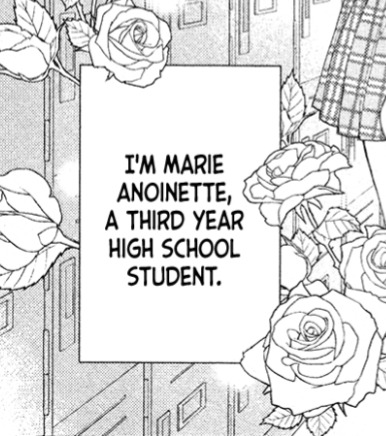
They deyassified polignac i am about to tjrow hands
#i have so many questions why is the main chick a high school deliquent wasm't the manga quasi historical#ask#anon
16 notes
·
View notes
Note
King chalres iii supporting find princes in the tower by dna
Hello! Are you talking about this headline, or is there a new one? But yeah, apparently it's Tracy Borman who said Charles is supportive but I don't know if we can take this as formal approval from him. Honestly, I didn't get really excited about this news because at max what we can prove or disprove is if those are the sons of Edward IV. We still can't prove in what circumstances the princes died or who killed them. Not that it would matter to Langley and her team, they would eat any indication that those aren’t Edward IV’s sons just to say it's definitive proof that King Richard didn't kill the boys, regardless of the possibility that Richard could have disposed of the bodies anywhere else outside of the Tower (or Windsor, in the case of those other bones). I think it's just feeding the team of lunatics that Langley leads, and after the whole anti-intellectual barbarity committed by them against the University of Leicester and their archaeologists I think we shouldn't give them any more credibility. This is the person who after seeing Richard's face reconstruction (and after being disappointed about his looks), said it was definitely "not the face of a killer". They take anything as proof of his innocence.
#it's honestly so ugly how the likely murder of two boys#gets used as a tool to quasi-canonise a king#they can't accept him in his historical context#or as product of his upbringing and family history#ask#anon
10 notes
·
View notes
Text
not to sound like a pretentious jackass but i just think its fun to mess around w these knights genders in the specific context of the medieval stuff
#LIKE .#my cam(elot) stuff takes place in more like. fantasy pseudo wales/ireland/ect (not britan)#and im 100% Not fucking qualified in the LEAST to talk about this to be clear i just think its neat ljfdsjlkf#bc like#the 'she' wasn't invented (in english) until like#the 12hth century i think#n like#idk gestures vaguely#i just think its interesting to try and find ways to describe the queer experience in a quasi-historical setting and not having the characte#rs use more modern terminology#(with the exception of like the new york stuff bc in that case yes#it would make sense for them to use modern terminology bc they are in the Current Time)#i had more i wanted to say but i got distracted by wikipedia having hit/him pronouns in their middle english personal pronouns page and i NE#ED to give it to one of my knights immediately#anyway sorry jlkfskldf
7 notes
·
View notes
Text
it sucks so fucking bad when people call reactionaries ignorant. it’s especially laughable to call jkr of all people ignorant. it is a liberal analysis of how reactionary beliefs operate, which is that bigotry is the result of insufficient education, that it is a symptom of an underlying deficit of information, and that bigotry is always at least partially indistinguishable from real, actual ignorance. while it’s true that fascist worldviews are not empirical, that is not because these people have simply missed the opportunity to correct their lack of historical understanding about the world. It is a conscious decision to reject, revise, or deny historical evidence; it is a conscious decision to believe antisemitic and transphobic and antiblack and misogynistic and islamophobic conspiracy theories. These people have not been led astray by their own ignorance, they are agents in their own lives who decide every single day to believe these things, and calling that behaviour “ignorance” is obfuscating that and positioning them as quasi-victims in their own bigotry. They are not otherwise fine people whose education needs correcting, they are political enemies of the vulnerable and want to exterminate them. that is the source of their beliefs, not ignorance
3K notes
·
View notes
Text
Tiny emo teen Lola Fae ass destroyed by a huge cock
BackShots From Petite Ebony
Blonde Young Girl Spreading To Sugar Daddy
Mi vecina se toca para mi
Sexy white pussy close up with creampie from sexy white cock
SWEET CREAMPIE IN WHITE PUSSY
Amateur milf anal Ryder Skye in Stepmother Sex Sessions
myvegas slots app
Hot Lesbians Ass Fuck A Double Ended Dildo
RUIVINHA DE SP DANDO GOSTOSO
#quasi-historically#binationalism#alliancer#sociologizing#tranquilizer#catter#prolately#chimneypiece#Lehi#unedibly#squamoid#sonnet#eupepsies#Gnosticize#plastering#leaseholds#high-lived#tops#siphonal#fernshaw
0 notes
Text
as someone with an interest in costume design, i'm fascinated by goncharov's quasi-nostalgic aesthetic. so many of the clothing choices seem intentionally anachronistic for a soviet crime thriller, not to mention the color palette.
in 1973 this would've been a contemporary drama, and there's an obvious overlap with the wave of early-70s paranoia thrillers (klute, the parallax view) and american cinema generally becoming obsessed with gritty crime dramas. you can absolutely see why scorsese was attracted to this project, but of course, a) this isn't an american movie emerging from american trends, and b) a lot of goncharov's visual choices aggressively *reject* the kind of gritty urban modernity we associate with 1970s movies about sad doomed violent men.
goncharov takes place in the late 1960s or early 1970s, but while katya and andrey's styling is *very* contemporary, goncharov himself is consistently dressed in very sharp early/mid-20th suits and hats. he doesn't even seem to wear synthetic fabrics.

maybe this is just meant to signal that goncharov has very picky (and eccentric) taste in clothes, which falls into a long tradition of antiheroes with snappy signature outfits. (jean-pierre melville's le samouraï came out 2 years before this.) sometimes filmmakers just want their protagonists to Look Cool. however i'm inclined to think there's something more going on here on a thematic level, especially when you combine goncharov's costumes with all the sepia-toned scenery and faux-historical production design elements. the story is rooted in contemporary 1970s politics but goncharov himself is stuck in the past, following a narrative arc that is clearly preordained from the start. so on a thematic level, matteo jwhw7015 is almost positioning him as the protagonist of a historical drama.
5K notes
·
View notes
Note
What would you call the genre where the setting is clearly fictional and often quasi-historical, but the setting has no otherwise fantastical elements?
Fiction, mostly. But sometimes Fantasy. It depends a lot on the setting.
934 notes
·
View notes
Text
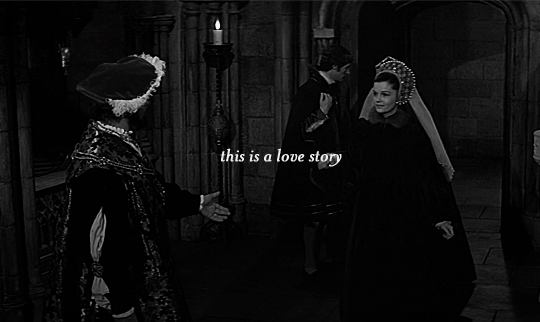
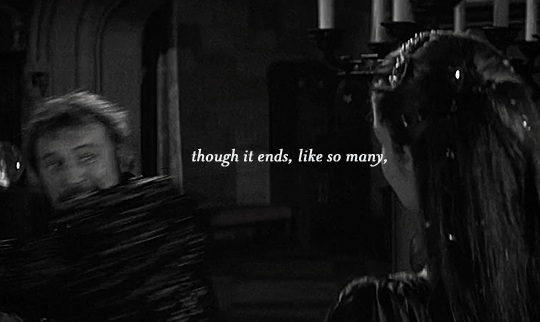
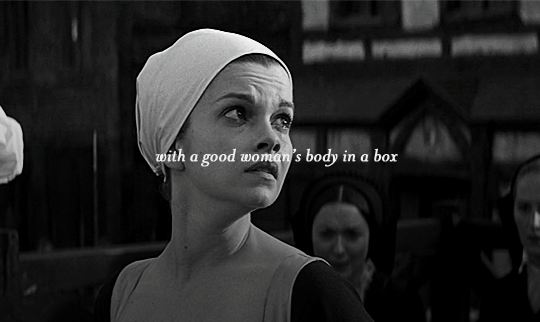
- Anne Boleyn's Sleeve by Juliana Gray, "The End"
However understandable the impulse to universalise Anne Boleyn’s story might be, these attempts mostly fail to account for the very historic specificity of her narrative. How can we account for a woman who apparently had so much sexual and emotional appeal she had the power to cleave King and country from the control of the Catholic Church, yet whose downfall was so complete she became the first English queen consort to face the executioner?
The story of Anne Boleyn is about dissenting from and challenging the dominant cultural norms; her example is that of the woman who created herself and, for a brief time, through her brilliance and her beauty and her will, maintained herself in a society in which quasi-independent female empowerment and agency were relatively unknown. She continues to speak to us as an avatar of feminine power.
- Stephanie Russo, The Afterlife of Anne Boleyn: Representations of Anne Boleyn in Fiction and on the Screen
#i start preparing for may in january 💅🏻#historicwomendaily#historyedit#anneboleynedit#anne boleyn#anne of the thousand days#genevieve bujold#history#*
197 notes
·
View notes
Note
thots on astrology? related, thoughts on mbti?
k i like that you guys just pop in my inbox from time to time and invite me to run my mouth about topics and concepts. like truly what else is this website for.
anyway astrology (& sorry, most of what i know here pertains specifically to europe in the middle ages onward) is genuinely such a bizarro historical case of a science whose core epistemological presupposition (a geocentrist and specifically anthropocentrist cosmology) has completely fallen out of favour in both popular and professional discourse, and i don't think most people appreciate how weird it is for astrology to continue existing with this degree of popular and mainstream participation lol. like most fringe science actually bothers to have some semblence of its own reactionary epistemology to fall back on; astrology just doesn't seem to care. it would be like if the medical guilds fully endorsed the position that blood is circulated in the human body by the heart, but then also recommended as treatments for clotting disorders medical practices that only make sense on the supposition that the liver is the origin of all blood and is continuously creating more of it. like no other science that i can think of tries to have it both ways to the extent astrology does. like, one reason phrenology and eugenics are bad comparison points here is because they're very much copacetic with post-enlightenment naturalism and evolutionary transpositions in the social sciences. astrology, like, intellectually is not and yet here it is anyway. ideology innit.
anyhow i assume the reason you asked about this in conjunction with mbti is because today's astrology is largely purporting to provide psychological analysis and is therefore more similar to a system like mbti than to the historical use of star-reading as a predictive science. obviously both astrology and mbti are deeply reactionary in this respect and belong to a larger trend toward attempting to categorise, measure, and taxonomise the psyche, tho an important difference here is that mbti has hereditarian elements, which no form of astrology that i know of does. i think astrology's shift in the personal-psychological direction has to do with a few different factors, including medical astrological practice (orthodox in the european middle ages, then varying degrees of heterodox from the early modern period onward) and self-help movements in the 20th century.
but in any case it, mbti, and similar attempts at psychometry are, like, staggeringly essentialist in conception and practice, and i do think their current popularity reflects some deeply reactionary tendencies amongst people who often (not always) consider themselves otherwise progressive or leftist. it's honestly kind of worrisome how many people will jump on a project that explicitly aims to define static and immutable human 'types' as long as it's dressed in quasi-spiritual or psy-scientific terminology. like i do think we all need to pause and think about the ideological ends and consequences of how we talk about each other and our bodies, minds, and birth circumstances 😵💫
836 notes
·
View notes
Text
What is the family? So deep runs the idea that the family is the exclusive place where people are safe, where people come from, where people are made, and where people belong, it doesn’t even feel like an idea anymore. Let us unpick it, then.
The family is the reason we are supposed to want to go to work, the reason we have to go to work, and the reason we can go to work. It is, at root, the name we use for the fact that care is privatized in our society. And because it feels synonymous with care, “family” is every civic-minded individual’s raison d’être par excellence: an ostensibly non-individualist creed and unselfish principle to which one voluntarily signs up without thinking about it. What alternative could there be? The economic assumption that behind every “breadwinner” there is a private someone (or someones) worth being exploited for, notably some kind of wife—that is, a person who is likely a breadwinner too—“freely” making sandwiches with the hard-won bread, or hiring someone else to do so, vacuuming up the crumbs, and refrigerating leftovers, such that more bread can be won tomorrow: this feels to many of us like a description of “human nature.”
Without the family, who or what would take responsibility for the lives of non-workers, including the ill, the young, and the elderly? This question is a bad one. We don’t hesitate to say that nonhuman animals are better off outside of zoos, even if alternative habitats for them are growing scarcer and scarcer and, moreover, they have become used to the abusive care of zoos. Similarly: transition out of the family will be tricky, yes, but the family is doing a bad job at care, and we all deserve better. The family is getting in the way of alternatives.
In part, the vertiginous question “what’s the alternative?” arises because it is not just the worker (and her work) that the family gives birth to every day, in theory. The family is also the legal assertion that a baby, a neonatal human, is the creation of the familial romantic dyad; and that this act of authorship in turn generates, for the authors, property rights in “their” progeny—parenthood—but also quasi-exclusive accountability for the child’s life. The near-total dependence of the young person on these guardians is portrayed not as the harsh lottery that it patently is, but rather as “natural,” not in need of social mitigation, and, furthermore, beautiful for all concerned. Children, it is proposed, benefit from having only one or two parents and, at best, a few other “secondary” caregivers. Parents, it is supposed, derive nothing so much as joy from the romance of this isolated intensity. Constant allusions to the hellworld of sheer exhaustion parents inhabit notwithstanding, their condition is sentimentalized to the nth degree: it is downright taboo to regret parenthood. All too seldom is parenthood identified as an absurdly unfair distribution of labor, and a despotic distribution of responsibility for and power over younger people. A distribution that could be changed.
Like a microcosm of the nation-state, the family incubates chauvinism and competition. Like a factory with a billion branches, it manufactures “individuals” with a cultural, ethnic, and binary gender identity; a class; and a racial consciousness. Like an infinitely renewable energy source, it performs free labor for the market. Like an “organic element of historical progress,” writes Anne McClintock in Imperial Leather, it worked for imperialism as an image of hierarchy-within-unity that grew “indispensable for legitimating exclusion and hierarchy” in general. For all these reasons, the family functions as capitalism’s base unit—in Mario Mieli’s phrase, “the cell of the social tissue.” It may be easier to imagine the end of capitalism, as I’ve riffed elsewhere, than the end of the family. But everyday utopian experiments do generate strands of an altogether different social tissue: micro-cultures which could be scaled up if the movement for a classless society took seriously the premise that households can be formed freely and run democratically; the principle that no one shall be deprived of food, shelter, or care because they don’t work.
Sophie Lewis, Abolish the Family
1K notes
·
View notes